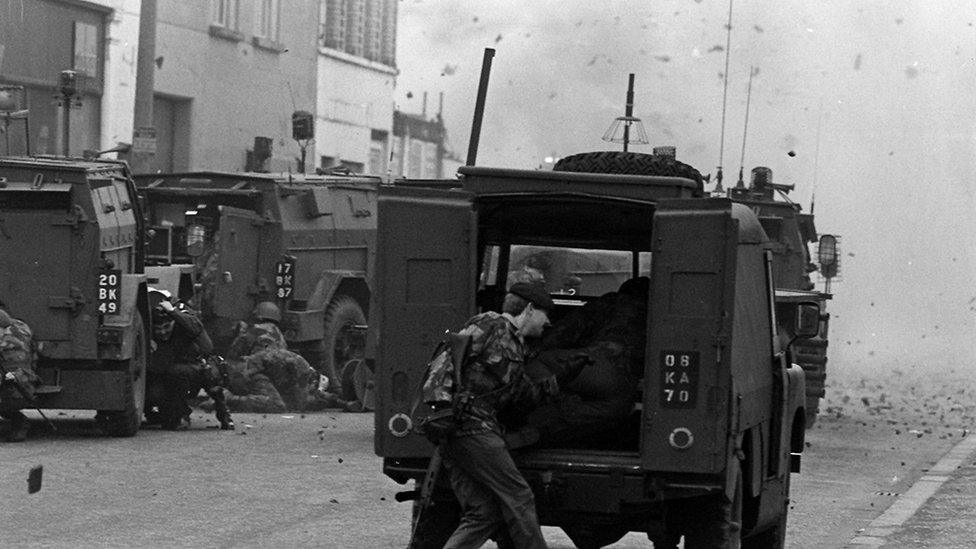The Troubles: School curriculum 'must change to examine conflict'
- Published

Soldiers running from a bomb in the Smithfield area of Belfast at the height of the Troubles
The school curriculum should change so that all pupils in Northern Ireland can be taught about the Troubles, a report has recommended.
It looked at the continuing effect of the conflict on the lives of children and young people in Northern Ireland.
The research found current teaching about the conflict "could be selective, partial, lacking in depth or absent".
But it said parents and young people should be consulted on curriculum changes.
The report, entitled "It didn't end in 1998: Examining the Impact of Conflict Legacy Across Generations", was carried out by the Centre for Children's Rights at Queen's University for the Commission for Victims and Survivors.
Its findings are based on interviews and focus groups with almost 60 community workers and parents, more than 100 children and young people aged 14-24 as well as government departments and statutory agencies.
The report studied ways they learn about the past and their identity and culture and how that affected them.
It found that young people learned about the conflict from a range of sources including social media, but mainly in school or from their families.
The roots of Northern Ireland’s Troubles lie deep in Irish history
But it said that what they learned in school or at home could vary widely.
"Accounts of learning in the family context varied from families who did not talk about the past, to young people who overheard accounts in adult conversations, to those whose parents, grandparents and other family members recounted detailed stories of the conflict and its impact on family and communities," the report said.
What young people learned in school, meanwhile, could depend on the approach taken by their school or individual teachers.
"Children's opportunities to discuss and make sense of the Troubles are limited," the report said.
"The potential to glorify or romanticise the past was a key concern where children were not included in discussions about the impact of the Troubles/conflict in communities and families.
"Participants noted that selective or partial accounts may perpetuate sectarian views that can reinforce a divisive mind-set between communities across the generations."
Some of those interviewed by the researchers, however, expressed concerns that learning about the Troubles could have a negative effect on young people's mental health.
'Strongly embedded in the past'
The report also said that "formal learning focused on exam success" did not encourage the discussion that would necessarily help young people understand the conflict.
It recommended that the school curriculum should be "revised to consider the delivery of teaching on the conflict".
"Consideration should be given to the age at which to introduce learning to ensure this begins before any negative attitudes can be entrenched."
The research also found that a young person's family was where they learned most about culture and identity.
"The views and attitudes held by parents, grandparents and other older family members were strongly embedded in past experiences of the conflict," the report said.
"Young people require a safe space to explore their meaning of their own culture and identity and to learn about those of others."
The researchers also said that Northern Ireland remained a "highly segregated" society - in housing, education and other "single-identity activities".
That meant contact with young people from the "other community" was often limited.
Some young people and adults said segregation offered "a sense of safety" and they were concerned about the removal of things like peace walls.

The mainly-divided school system in Northern Ireland has come under criticism
"More typically, however, participants (particularly young people and community representatives) identified the negative impact of segregation in the community," the report said.
Many were critical of the mainly-divided school system in Northern Ireland, and said it "creates and reinforces barriers between young people of different communities".
A number of people, including sports stars Oisin McConville and Andrew Trimble, have previously expressed similar views.
The report said there was a need for more "shared spaces" for young people from different backgrounds and communities to come together.
Deprivation, opportunities, investment
It also concluded that the prospects, wellbeing and mental health of young people could still be affected by the Troubles.
"The conflict's lasting impact on deprivation, opportunities and investment, under-resourcing of communities and essential services was widely discussed," it said.
The research also looked at how the legacy of the Troubles continued to affect family life and attitudes to the police and paramilitary groups.
"Knowledge of the existence and actions of so-called paramilitary-style groups was pervasive, and 'paramilitary talk' among young people within some communities was commonplace," it said.
"The presence of paramilitaries meant the potential for violence was ever present.